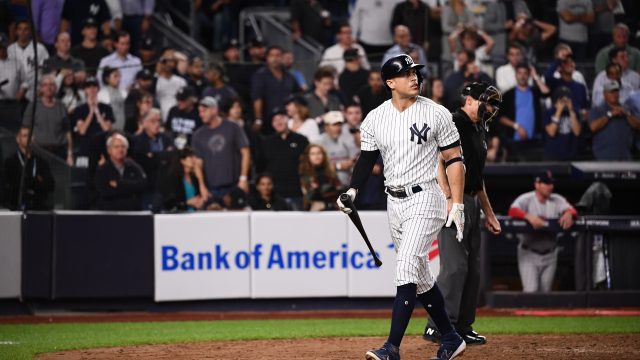Pro Athletes Facing Bigger Tax Bills Should Blame High-Tax States Not Trump’s Tax Reform

The New York Yankees’ Giancarlo Stanton strikes out in the 9th inning of Game 4 of the American League Divisional Series, in New York, Oct. 8, 2018. The Yankees did little in the off-season to address their most pressing needs, and those shortcomings cost them against the Red Sox. (Ben Solomon/The New York Times)
“Why pro athletes may lose a fortune because of the new tax law,” reads a headline from MarketWatch.
Professional athletes aren’t the most sympathetic demographic. Even players making the minimum in their leagues are usually taking home multiples of the median household income for Americans.
Still, the Trump tax cuts were promised to be tax cuts, so what’s going on?
It turns out the real culprit isn’t so much the federal tax reform as the high-tax states these players are living in. One thing the federal tax law did was end a policy letting individuals deduct their state and local tax bills from their federal tax bill. With that deduction’s demise, these pro athletes (and millions of other Americans) are now facing the stark reality of just how high taxes are in states like California and New York:
Some athletes try to play for a team in one of the no-income-tax states, so that they pay no state income tax for their home games, and their endorsement earnings. And other players choose to live in one of these states, even if they play for a team in another state. Washington, Texas, Nevada, Florida, Alaska, Wyoming, and South Dakota charge no taxes on income — and only the first four of these have teams in the major sports leagues. Also, Washington, D.C., isn’t allowed to charge income tax to non-residents.
Speaking of the no-tax states, MarketWatch’s own Tax Guy, Bill Bischoff, says it’s probably not a coincidence that the recent Tiger Woods vs. Phil Mickelson golf match was played in Nevada, where Mickelson, who years ago was vocal about his dislike for the taxes he paid as a California resident, made $9 million for winning.
When it comes to living in a state other than where your team is based, a downside is that you have to prove you were in your “domicile” state for at least 183 days that year. Goldstein says he stresses to his players how important that is. And Sean Packard, a CPA with OFS Wealth in McLean Va., which works with over 200 athletes and celebrities, adds that some states are especially tough. “New York is aggressive with auditing when high earners try to claim residency somewhere else. I’ve had players go through it.”
According to the article, some teams in states with low taxes (or no income tax, as the case may be) use that fact as a tool to recruit players:
Teams in the no-tax states know they have an advantage attracting players. An executive for a team in a low-tax state recently asked Goldstein to crunch the numbers on how much more a player on a team in California would have to make to take home the same amount of money as a player in its state.
Packard points out that certain teams have always tried to play up the fact their states have low taxes. “We had a free agent with offers from three teams, and the GM for the Texas team said, ‘If you take our salary, they’d have to offer you this much to match it.’ The agent asked if they were accurate.”
Makes sense, but back to the issue of tax reform costing these players, they should direct their ire toward states with high taxes and not the federal government.
For a long time federal tax payers across the nation were subsidizing high tax regimes in states like California and New York. Those local governments could get away with charging higher taxes because the impact of those taxes was mitigated by the federal deduction.
But that can’t happen any more, and hopefully that will result in pressure put back on the states to modify their tax codes. Which might actually be the most consequential aspect of the Trump tax reforms. Not only have they reduced federal tax burdens, but they may well result in lower state tax burdens too.




